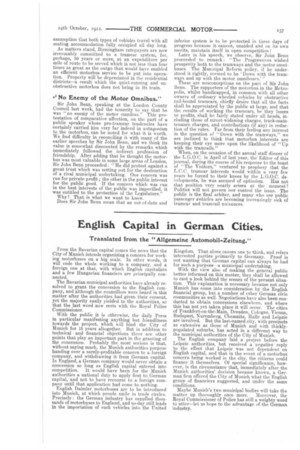English Capital in German Cities.
Page 3

If you've noticed an error in this article please click here to report it so we can fix it.
Translated from the " Allgemeine Automobil-Zeitung."
From the Bavarian capital comes the news that the City of Munich intends organizing a concern for working motorbuses on a big scale. In other words, it will cede the whole working to a company, and a foreign one at that, with which English capitalists and a few Hungarian financiers are principally connected.
The Bavarian municipal authorities have already resolved to grant the concession to the English company, and although the councillors were heard in this matter after the authorities had given their consent, yet the majority easily yielded to the authorities, so that the last word now rests with the Royal Police Commissioner.
With the public it is otherwise, the daily Press in particular manifesting anything but friendliness towards the project, which will bind the City of Munich for 15 years altogether. But in addition to technical and financial objections there are other points that play an important part in the granting of the concession. Probably the most serious is that, without saying much, the Munich authorities purpose handing over a surely-profitable concern to a foreign company, and withdrawing it from German capital. In England, a German company would never obtain a concession so long as English capital entered into competition. It would have been for the Munich authorities a national duty to apply first to German capital, and not to have recourse to a foreign company until that application had come to nothing.
English Daimler motorbuses are to be introduced into Munich, at which people smile in trade circles. Precisely : the German industry has supplied thousands of motorbuses to England, and to-day still leads in the importation of such vehicles into the United Kingdom. That alone causes one to think, and refers interested parties primarily to Germany. Proof is not wanting that German capital can always be had for such a purnoee--a municipal undertaking.
With the view also of making the general public better informed on this matter, they shall be allowed to cast a look behind the scenes of the present situation. This explanation is necessary because not only Munich has come into consideration by the English financial group, but a number of other German civic communities as well. Negotiations have also been conducted to obtain concessions elsewhere, and where this has not yet taken place it will occur. The cities of Frankfort-on-the-Main, Dresden, Cologne, Vienna, Budapest, Nuremberg, Chemnitz, Halle and Leipzic are involved. But the last-named city, with precincts as extensive as those of Mismich arid with thicklypopulated suburbs, has acted in a different way to the municipal authorities of the City of Munich. The English company laid a project before the Leipzic authorities, but received a negative reply to the effect that Leipzic was not dependent on English capital, and that in the event of a motorbus concern being worked in the city, the citizens could finance it themselves. Of special significance, however, is the circumstance that, immediately after the Munich authorities' decision became known, a German firm offered the City of Munich what the English group of financiers suggested, and under the same conditions.
Maybe Munich's two municipal bodies will take the matter up thoroughly once more. Moreover, the Royal Commissioner of Police has still a weighty word to utter—let us hope to the advantage of the German industry.






















